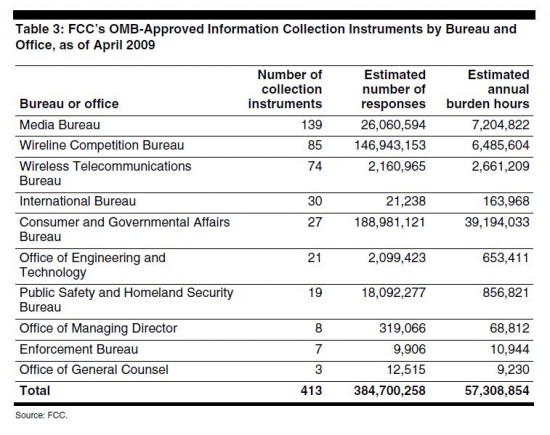by Adam Thierer & Berin Szoka
 We're hoping that the Government Accountability Office (GAO) has made some sort of mistake, because it's hard to believe its latest findings about the paperwork burden generated by Federal Communications Commission (FCC) regulatory activity. In late January, the GAO released a report on "Information Collection and Management at the Federal Communications Commission" (GAO-10-249), which examined information collection, management, and reporting practices at the FCC. The GAO noted that the FCC gathers information through 413 collection instruments, which include things like: (1) required company filings, such as the ownership of television stations; (2) applications for FCC licenses; (3) consumer complaints; (4) company financial and accounting performance; and (5) a variety of other issues, such as an annual survey of cable operators. (Note: This does not include filings and responses done pursuant to other FCC NOIs or NPRMs.) We're hoping that the Government Accountability Office (GAO) has made some sort of mistake, because it's hard to believe its latest findings about the paperwork burden generated by Federal Communications Commission (FCC) regulatory activity. In late January, the GAO released a report on "Information Collection and Management at the Federal Communications Commission" (GAO-10-249), which examined information collection, management, and reporting practices at the FCC. The GAO noted that the FCC gathers information through 413 collection instruments, which include things like: (1) required company filings, such as the ownership of television stations; (2) applications for FCC licenses; (3) consumer complaints; (4) company financial and accounting performance; and (5) a variety of other issues, such as an annual survey of cable operators. (Note: This does not include filings and responses done pursuant to other FCC NOIs or NPRMs.)
Regardless, the FCC told the GAO that it receives nearly 385 million responses with an estimated 57 million burden hours associated with the 413 collection instruments. A "burden hour" is defined under the Paperwork Reduction Act as "the time, effort, or financial resources expended by persons to generate, maintain, or provide information to a federal agency." And the FCC is generating 57 million of 'em! Even though we are frequently critical of the agency, these numbers are still hard to fathom. Perhaps the GAO has made some sort of mistake here. But here's what really concerns us if they haven't made a mistake. 
Assuming the GAO got these numbers right, just think of the deadweight economic loss associated with all this paperwork, and think of how it will grow in months and years to come! Can you imagine how much the numbers have likely grown so far this year, with the agency generating so many new public notices, notices of inquiry, requests for information, and more? And just think what the paperwork burden will look like once the National Broadband Plan and Net neutrality regulations kick in! Oh my... The agency has already promised lots more notices will flow out of the National Broadband Plan to implement various portions of it.
In terms of the deadweight loss, go back to the numbers Adam cited in his essay last week asking, "Will the FCC's Nat'l Broadband Plan Be "Full Employment for Lawyers"? As noted there, lawyers were about the only group that did fairly well thanks the FCC's over-zealous regulatory ways in the post-Telecom Act period. Greg Sidak of Georgetown University Law School found that the number of telecom lawyers-as measured by membership in the Federal Communications Bar Association-grew by a stunning 73% in the late 1990s. That was largely driven by a 37% hike in FCC spending and a tripling of the number of pages of regulations in the FCC Record in the post-Telecom Act period. Sidak argued, "If one assumes (very conservatively) that the average income of an American telecommunications lawyer is $100,000, then the current membership of the FCBA represents an annual expenditure on legal services of at least $340 million." And we all know that those lawyers were making a heck of lot more than just $100K (and billed even more), so Sidak's estimates were ultra-conservative: The deadweight loss of all this legal activity was much greater.
Indeed, a very conservative estimate of hourly rates for Washington communications lawyers would be $200/hour, but even at that rate, 57 million burden hours would equate to a total cost of $11.4 billion. In fact, when major Washington law firms use "blended rates" to bill out the time of senior partners, junior associates, and paralegals working in teams on things like regulatory filings, the figure is more like $350-400 (if not more)--which would equate to a deadweight cost of $20-23 billion every year. To put that staggering number in perspective, leaks about the National Broadband Plan indicate that the FCC might be planning on spending about that much to subsidize broadband deployment over a decade.
Or, to use another comparison, NASA's 2010 budget is a mere $18.69 billion. That's in the same ballpark as what, according to the GAO's man-hour estimates, the FCC's reporting requirements cost U.S. industry every year. As Wernher von Braun famously said about the Apollo program, which he led: "We can lick gravity, but sometimes the paperwork is overwhelming."
So, "if we can put a man on the moon," as they say, why can't we do something about this paperwork burden so America's communications, media, and high-tech providers can focus on actually providing better, faster, and cheaper service to consumers? posted by Adam Thierer @ 12:42 AM |
The FCC
Link to this Entry | Printer-Friendly | Email a Comment | Post a Comment(9)
|
